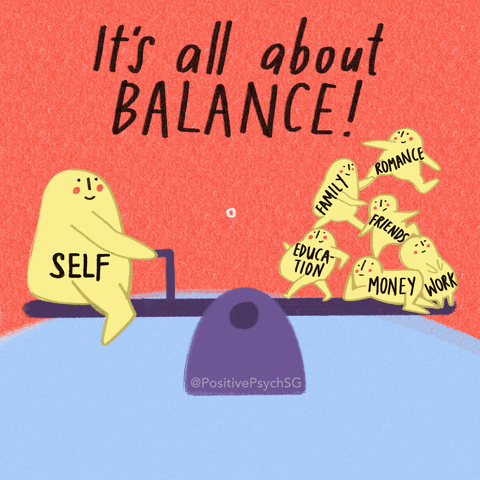"How to be alone without being lonely?"
A member asked this question in HeyEmotions WhatsApp Community.
If you're a consistent reader of HeyEmotions, you may know by now what I do with such introspective questions.
I convert them into HeyEmotions editions :)
In today’s edition, we’ll explore the answer for the question,
How to be alone without being lonely?
Let’s first understand what the words “alone” and “lonely” mean. Yes, you guessed it right – they are NOT the same.
According to Google, the literal meanings of,
Alone: having no-one else present.
Lonely: sad because one has no friends or company.
You can have no-one else around yet you can feel happy. Meaning, you can be alone but not lonely.
You can have your people around yet you can feel sad and isolated. Meaning, you can be not alone but lonely.
Hope it helps you understand the difference between alone-ness and loneliness 😊
Btw, the state or situation of being alone is also called solitude.
Solitude means enjoying one’s own company. It helps one in reconnecting with themselves. It results in better creativity and clarity. Hence, solitude is something that people aspire to experience. (If you’re reading this piece, the chances are that you’re one of those people.)
The purpose of solitude is to remove all the distractions that keep one’s mind occupied. Henceforth, making space for their feelings, beliefs, thoughts, habits and perspectives to surface.
This surfaced stuff then acts as a bridge to know oneself better, receive new ideas, tap into the reservoir of creativity, make changes, better their life…and what not.
The problem occurs when solitude becomes a reminder of the times when one felt all alone in their heart. Ultimately, the very thing that they want to leverage, i.e. alone-ness/ solitude, ends up triggering their fears and experiences that prove why solitude is painful and not worth experiencing.
In our day-to-day life, it sounds like this:
“I want to be alone. I want to enjoy solitude and my own company. But I can’t. Because every time I’m alone, it reminds me how lonely I’m. And I end up feeling miserable.”
So how to enjoy alone-ness without being lonely? Or to simplify the question:
How to enjoy and feel happy in your own company?
Here comes the answer in five points:
Identify the difference between being bored and being lonely
If you’re used to having people around, you may feel bored when they’re not around and you’re with yourself. That feeling of “getting bored” is NOT necessarily the same as feeling lonely.
Boredom gives you frustration or can even make you restless. But loneliness makes you feel sad and hurt. These last two sentences are not alike. So pay attention to what you feel when you’re with no-one but yourself.
If you feel boredom, take it as a positive sign that you’re on the way to experience solitude. Because by cultivating boredom, we arrive at solitude (a topic for another edition).
If you feel lonely, use the points ahead.
Make a list of activities that you enjoy doing on your own
It’ll be hard to make this list when you’re feeling lonely. So have it prepared already for the times when you may need it. Make sure, you do it with a calm mind without any haste. For it’ll require you to go back to your memories to scan the activities that you enjoyed all on your own without any other person’s active presence with you.
Don’t overthink. Write whatever comes to your mind. Use this list as your reminder that you’re after all capable of enjoying your own company. Because:
Often it’s our belief “we always need others to feel happy” that keeps us away from our own capability of keeping ourselves happy.
Also, try doing the activities mentioned in this list when you feel lonely. And observe how you feel.
Get curious and identify the underlying need
You’re not crazy for wanting to have other people's company even if it’s all the time. Because it shows there’s an important need of yours that others’ company fulfills. The more you want other people's company, the more important that need is for you.
So it only makes sense that by changing the source of fulfillment for that need from other people to yourself, you can actually come one step closer to enjoying your own company.
How to identify that need?
Ask these questions to yourself:
What does other people’s company make me feel? (the answer will go deeper than “I feel happy”)
Do I feel good only when I’m with other people?
Is there any specific person(s) whose company I like the most? If yes, why?
Does others’ company remind me of something that I used to feel or experience in my childhood?
How do I feel about myself when I’m with others?
These questions will help you identify what it is that you knowingly or unknowingly seek from other people’s company.
Build the new source of fulfillment
After identifying your need(s) that other people's company fulfills, start wondering – How can you fulfill those needs on your own?
If other people's company makes you feel appreciated and that's your need, ask: "How can I make myself feel appreciated on my own? What do I do with other people which makes me feel appreciated? What do they say or do that makes me feel appreciated?"
Whatever it is that you find, do it. It can be gifting yourself your favorite books, taking yourself on solo dates, dancing to your favorite music, giving yourself a tight hug, patting your back, etc.
If others' company remind you of your strengths and that 's what you wish to be reminded of, ask: "How can I remind myself of my strengths? What do other people say or do that makes me confident of my strengths? What can I say to myself or do for myself that keeps me confident of my strengths?"
The answers of these questions will help you come up with your own set of reminders to celebrate your strengths. Like, writing a list of your strengths on a whiteboard, scheduling uplifting emails to self for a week/ month/ year ahead, keeping a folder of your achievements and revisiting it, etc.
Find a balance
You don't have to stop seeking and enjoying other people's company to start enjoying your own company. It’s about balance – Balancing the need of being with oneself with the need of being with others.
After all, we're social beings.
Even when you enjoy your own company, you can crave for emotional support from someone else. It doesn't necessarily mean that you're lonely. Or that you can’t look after yourself. All it means is that – you're a human being.
We need other people’s company. We want to feel that we belong. It's our innate necessity.
So check – Is your necessity to feel belongingness taking you farther away from yourself? Or is it bringing you closer to yourself?
No-one likes to feel lonely.
What if it’s our disliking towards loneliness that makes it unpleasant to manage? What if we try to tweak the angle? What if we try looking at loneliness with neutrality – neither pleasant nor unpleasant? Just is.
When we do so, we may realize:
Loneliness has always been a reminder of our capability to love not just others but ourselves.
And that it reveals itself to us only when we’re alone.
So can we choose to be alone to witness this reminder in our hearts?
Can we give ourselves a chance to go from “alone and lonely” to “alone and not lonely?”
Until next Thursday,
Ashi







